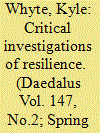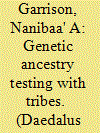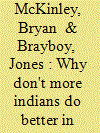|
|
|
Sort Order |
|
|
|
Items / Page
|
|
|
|
|
|
|
| Srl | Item |
| 1 |
ID:
158465


|
|
|
|
|
| Summary/Abstract |
The formal treaty-making period between the U.S. government and Native peoples ended in 1871, only four years after the United States purchased Alaska from Russia. As a result, Alaska Natives did not enter into treaties that recognized their political authority or land rights. Nor, following the end of the treaty-making period, were Alaska Natives granted the same land rights as federally recognized tribes in the lower forty-eight states. Rather, Congress created the Alaska Native Corporations as the management vehicle for conveyed lands in 1971. The unique legal status of these corporations has raised many questions about tribal land ownership and governance for future generations of Alaska Natives. Although Congress created the Native Corporations in its eagerness to settle land claims and assimilate Alaska Natives, Alaska Native cultures and governance structures persisted and evolved, and today many are reasserting the inherent authority of sovereign governments.
|
|
|
|
|
|
|
|
|
|
|
|
|
|
|
|
| 2 |
ID:
158474


|
|
|
|
|
| Summary/Abstract |
Indigenous peoples are among the most active environmentalists in the world, working through advocacy, educational programs, and research. The emerging field of Indigenous Environmental Studies and Sciences (iess) is distinctive, investigating social resilience to environmental change through the research lens of how moral relationships are organized in societies. Examples of iess research across three moral relationships are discussed here: responsibility, spirituality, and justice. iess develops insights on resilience that can support Indigenous peoples' struggles with environmental justice and political reconciliation; makes significant contributions to global discussions about the relationship between human behavior and the environment; and speaks directly to Indigenous liberation as well as justice issues impacting everyone.
|
|
|
|
|
|
|
|
|
|
|
|
|
|
|
|
| 3 |
ID:
158467


|
|
|
|
|
| Summary/Abstract |
Genetic ancestry tests have gained in popularity across the United States as more Americans seek answers about their ancestral past. The tests have been used to verify or dispute family stories about ancestors or to allow people to seek a sense of belonging with a particular tribe or community. They can also be useful in medical research to identify genetic variants across populations. At the same time, assumptions about genetic testing – and the very idea of a “genetic” identity – pose challenges for communities that are defined in terms of political, social, and cultural identities. This essay explores a range of uses of ancestry tests and their potential implications for Native American tribes and communities. It concludes that the scientific and recreational use of genetic ancestry testing continues to increase over time, but limitations of the consistency of results across platforms and the generalizability of knowledge remain.
|
|
|
|
|
|
|
|
|
|
|
|
|
|
|
|
| 4 |
ID:
158476


|
|
|
|
|
| Summary/Abstract |
Storywork provides an epistemic, pedagogical, and methodological lens through which to examine Indigenous language reclamation in practice. We theorize the meaning of language reclamation in diverse Indigenous communities based on firsthand narratives of Chickasaw, Mojave, Miami, Hopi, Mohawk, Navajo, and Native Hawaiian language reclamation. Language reclamation is not about preserving the abstract entity “language,” but is rather about voice, which encapsulates personal and communal agency and the expression of Indigenous identities, belonging, and responsibility to self and community. Storywork – firsthand narratives through which language reclamation is simultaneously described and practiced – shows that language reclamation simultaneously refuses the dispossession of Indigenous ways of knowing and refuses past, present, and future generations in projects of cultural continuance. Centering Indigenous experiences sheds light on Indigenous community concerns and offers larger lessons on the role of language in well-being, sustainable diversity, and social justice.
|
|
|
|
|
|
|
|
|
|
|
|
|
|
|
|
| 5 |
ID:
158475


|
|
|
|
|
| Summary/Abstract |
Indigenous sciences are foundationally based in relationships, reciprocity, and responsibilities. These sciences constitute systems of knowledge developed through distinct perspectives on and practices of knowledge creation and decision-making that not only have the right to be pursued on their own terms but may also be vital in solving critical twenty-first-century challenges. “Science” is often treated as if it were a single entity, free of cultural influences and value-neutral in principle. Western science is often seen as instantiating and equivalent to this idealized, yet problematic, view of science. We argue for engagement with multiple perspectives on science in general, and increased engagement with Indigenous sciences in particular. As scholars focused on human learning and development, we share empirical examples of how Indigenous sciences, sometimes in partnership with Western science, have led to new discoveries and insights into human learning and development.
|
|
|
|
|
|
|
|
|
|
|
|
|
|
|
|
| 6 |
ID:
158473


|
|
|
|
|
| Summary/Abstract |
A short contextual overview of the past and present opens up a discussion of the challenges surrounding American Indian leadership in the contemporary world and into the future. We survey some of the literature on Native American leadership and consider leadership issues in institutional settings such as academia, tribal governments, pan/inter-Indian organizations, public interest and NGO groups, and global Indigenous structures, suggesting ways in which non-Native organizations can better recognize, respect, and partner with American Indian leaders.
|
|
|
|
|
|
|
|
|
|
|
|
|
|
|
|
| 7 |
ID:
158466


|
|
|
|
|
| Summary/Abstract |
We use Hawaiian methods of knowledge production to weave together contemporary and historical instances of Kanaka Maoli (Native Hawaiian) political resistance to U.S. imperialism and settler colonialism. Our departure point is the summer of 2014, when hundreds of Kānaka came forward to assert unbroken Hawaiian sovereignty and reject a U.S. Department of Interior (DOI) proposal to create a pathway for federal recognition of a reorganized Native Hawaiian governing entity. This essay situates testimonies from these hearings within a longer genealogy of Kanaka assertions of “ea” (sovereignty, life, breath) against the prolonged U.S. military occupation of Hawai'i that began in 1898 and extends to the present.
|
|
|
|
|
|
|
|
|
|
|
|
|
|
|
|
| 8 |
ID:
158463


|
|
|
|
|
| Summary/Abstract |
In this essay, we present a brief genealogy of sovereignty, outlining debates about the term itself as well as the challenging legal terrain facing Indigenous nations' assertions of sovereignty today. We draw on the experiences of the Lake Superior and Mississippi Bands of Ojibwe for examples of how sovereignty has been debated and defined, from treaty-making practices establishing a political relationship with the United States to subsequent struggles for recognition of Ojibwe sovereign authority accorded in those same treaties. We find that the courts and Congress have oscillated between protecting and diminishing Indigenous nations' ability to exercise sovereignty. We argue for a return to the relational paradigm used by the Ojibwe in their treaty-making as a remedy for the damage done by the courts and by Congress. Rather than a rights-based approach to sovereignty, a relational paradigm foregrounds responsibilities to one another and to creation, which sustains us all.
|
|
|
|
|
|
|
|
|
|
|
|
|
|
|
|
| 9 |
ID:
158471


|
|
|
|
|
| Summary/Abstract |
Museums have long offered simplistic representations of American Indians, even as they served as repositories for Indigenous human remains and cultural patrimony. Two critical interventions–the founding of the National Museum of the American Indian (1989) and the passage of the Native American Graves Protection and Repatriation Act (1990)–helped transform museum practice. The decades following this legislation saw an explosion of excellent tribal museums and an increase in tribal capacity in both repatriation and cultural affairs. As the National Museum of the American Indian refreshes its permanent galleries over the next five years, it will explicitly argue for Native people's centrality in the American story, and insist not only on survival narratives, but also on Indigenous futurity.
|
|
|
|
|
|
|
|
|
|
|
|
|
|
|
|
| 10 |
ID:
158468


|
|
|
|
|
| Summary/Abstract |
The most widely accessible ideas and representations of Native Americans are largely negative, antiquated, and limiting. In this essay, we examine how the prevalence of such representations and a comparative lack of positive contemporary representations foster a cycle of bias that perpetuates disparities among Native Americans and other populations. By focusing on three institutions – the legal system, the media, and education – we illustrate how the same process that creates disparate outcomes can be leveraged to promote positive contemporary ideas and representations of Native Americans, thereby creating more equitable outcomes. We also highlight the actions some contemporary Native Americans have taken to reclaim their Native American identity and create accurate ideas and representations of who Native Americans are and what they can become. These actions provide a blueprint for leveraging cultural change to interrupt the cycle of bias and to reduce the disparities Native Americans face in society.
|
|
|
|
|
|
|
|
|
|
|
|
|
|
|
|
| 11 |
ID:
158464


|
|
|
|
|
| Summary/Abstract |
This essay is offered as a tribute to Golden Hill Paugussett Chief Big Eagle and his defiance of the entrenched racism to which his tribal community has been subjected. I situate this analysis in Connecticut in the early 1970s at a moment of particular historical significance in tribal nations' centuries-long struggles to assert their sovereignty, defend reservation lands, and ensure their futures. I analyze how the racialization of Native peoples in Connecticut informed the state's management of “Indian affairs” in this period and argue that the virulent racism of the state's antirecognition policy in the late twentieth century reflects a long history of institutionally embedded racist policies and practices. In this essay, I call for politically engaged, antiracist research that is concerned with understanding the complexities of tribal sovereignty asserted in local contexts in which governmental control of Indian affairs reproduces and validates White-supremacist ideology.
|
|
|
|
|
|
|
|
|
|
|
|
|
|
|
|
| 12 |
ID:
158470


|
|
|
|
|
| Summary/Abstract |
The public increasingly requires that higher education institutions demonstrate their return on investment by measuring graduation rates, cost per student, job placement rates, and income. The motivation is economic: public institutions are accountable to the investor, in this case, the taxpayer. Tribal Colleges and Universities (tcus), on the other hand, are indebted to and inspired by the revolutionary vision of their founders: the ancestors, elders, and community members who believed that higher education rooted in tribal sovereignty, identity, systems, and beliefs would ensure the survival and prosperity of their people. tcus are advancing Native student access and completion, developing scholars who are contributing to knowledge creation through community-based research, and promoting economic and entrepreneurial development in tribal communities.
|
|
|
|
|
|
|
|
|
|
|
|
|
|
|
|
| 13 |
ID:
158472


|
|
|
|
|
| Summary/Abstract |
One of the primary goals of the U.S. government's entry into health care was to protect soldiers by isolating tribal populations and inoculating them against infectious disease. When tribes signed the legally binding treaties, the United States promised them doctors, nurses, facilities, and basic health care. Yet this promise has never been fully funded by Congress. The Indian Health Service, which includes tribal and nonprofit health agencies, is tasked with defying gravity, and this has led to a regular cycle of heartbreaking stories about a system that fails American Indian and Alaska Native patients. Yet, at the same time, the Indian health system has achieved remarkable innovation and excellence.
|
|
|
|
|
|
|
|
|
|
|
|
|
|
|
|
| 14 |
ID:
158462


|
|
|
|
|
| Summary/Abstract |
In the summer and autumn of 2016, American Indian people1 (re)entered American political consciousness in ways not seen since the takeover of the South Dakota village of Wounded Knee in 1973. Wounded Knee featured a seventy-one-day siege, the mobilization of the American military against Indian activists, and copious media reportage; and it came on the heels of the 1972 takeover of the Bureau of Indian Affairs in Washington, D.C., the seizure and occupation of Alcatraz Island (1969–1971), and several best-selling books on Indian activism. In the early 1970s, Indian people and their challenges and possibilities achieved a political visibility that they had not held for a century.
|
|
|
|
|
|
|
|
|
|
|
|
|
|
|
|
| 15 |
ID:
158469


|
|
|
|
|
| Summary/Abstract |
American Indian/Alaska Native education – the training for life of children, adolescents, and adults – has been locked in battle for centuries with colonial schooling, which continues to the present day. Settler societies have used schools to “civilize” Indigenous peoples and to train Native peoples in subservience while dispossessing them of land. Schools are the battlegrounds of American Indian education in which epistemologies, ontologies, axiologies, pedagogies, and curricula clash. In the last century, Native nations, communities, parents, and students have fought tenaciously to maintain heritage languages and cultures – their ways of being in the world – through Indigenous education and have demanded radical changes in schools. Contemporary models of how educators are braiding together Indigenous education and Indigenous schooling to better serve Native peoples provide dynamic, productive possibilities for the future.
|
|
|
|
|
|
|
|
|
|
|
|
|
|
|
|
|
|
|
|
|